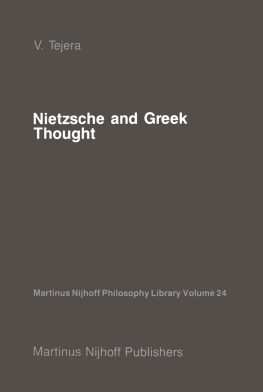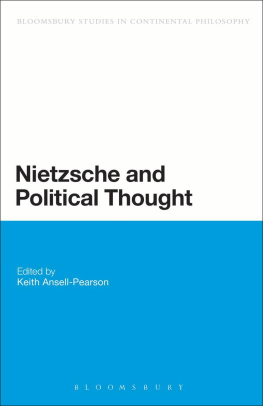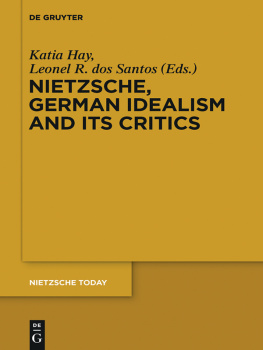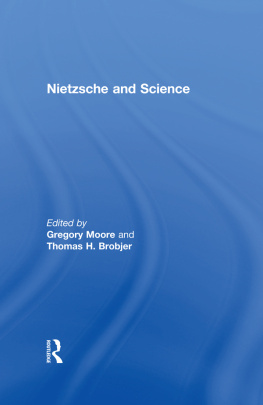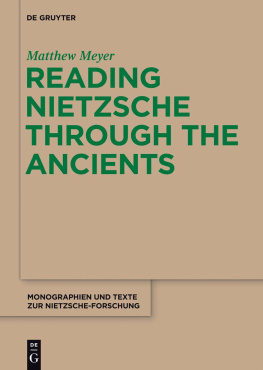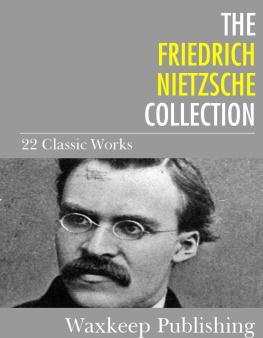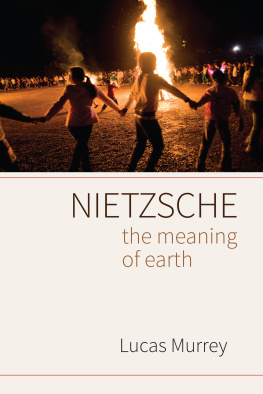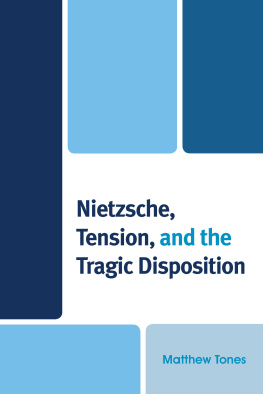Nietzsches Use of Intellectual History
Nietzsches views of history and historiography are just those that a philosopher of life and practitioner of the art of cultural analysis would have. As a cultural analyst, Nietzsche was philosophic in the sense that he criticized values, institutions and ideas (both artistic and religious) at the most reflective possible levels. Among the connotations of reflective we must include both self-reflective and practical, if we are to understand Nietzsche. Under practical we must include diagnostic, in the sense of examining patterns of conduct that correspond to intellectual pathologies, on Nietzsches analysis. Because Nietzsche makes such abundant use of ancient Greek thought in advancing his critique of the ideas of his own time, we can contrast his practice of intellectual history with his overt statements about the use of history in The Advantage and Disadvantage of History for Life.
Now, Nietzsche felt that it was only insofar as he was the nursling of older ages like the Greek rather than a child of the present age that he had come to his untimely insights. But he also believed that only he who is building the future has a right to judge the past (UAH 41). So, since you can explain the past only by what is most powerful in the present, it would follow for Nietzsche that: while the past is partly constitutive of the present, only those who are seeking to overcome a present which they understand and wish to change, are good explainers of the human past. These are just those who both have a historical consciousness and wish to use it creatively.
But the historical sense prevalent in Nietzsches Germany looked like a malignant fever (UAH sec. 4) to him and a sign of decay. So Nietzsches book is a criticism of the forms which historical consciousness had taken in his day. But Nietzsches work as a whole is itself an expression of the reason why his age was obsessed with history, namely, the hope that the past might provide models of conduct for the present. This search for models, Nietzsche believed, has both healthy and unhealthy forms. But the hope itself, it should be noted, is a corollary of the spreading disbelief to which Nietzsche is a decided contributor. Many historians also hoped to uncover, in the historical process itself, some pattern within which mans salvation, or perfectibility, could be heralded as immanent or possible. But Nietzsches excursus on forgetfulness which opens UAH is clearly a response to the overselling of the historical sense by scholars and popularizers.
The concern of UAH is to identify both the deadly and the liberating, or life-giving, aspects of history. It is an aspect of Nietzsches larger project of identifying the ways in which mankind, in the interest of its own health, could consciously recover its ability to grasp the world mythically. As he was to say in The Genealogy of Morals , we have art in order not to die of the truth. But because the critical-historical spirit of our culture has made the previous existence of myth credible only by means of scholarship, Nietzsche has to state in The Birth of Tragedy that:
without myth every culture loses the healthy natural power of its creativity: only a horizon defined by myths completes and unifies a whole cultural movement. Myth alone saves all powers of the imagination and of the Apollonian dream from aimless wanderings. The images of myth have to be the unnoticed omnipresent demonic guardians, under whose care the young soul grows to maturity and whose signs help the adult interpret his life and struggles. Even the state knows no more powerful unwritten laws than [those of] the mythical foundation.
Any people, Nietzsche claims, any individual is worthy only insofar as it is able to press the stamp of the eternal upon its experience; for only then is it demundanized ( entweltlicht ) and able to show its unconscious inner convictions about the relativity of time and truth, i.e., about the metaphysical significance of life. The opposite of this happens when a people begins to comprehend itself historically and to demolish the mythical bulwarks that gird it around (BT 23).
So, the historical self-understanding that a people can achieve for itself should not be any weaker in social effectiveness than that once provided by the myths. It is this desideratum that energizes Nietzsches criticism of the histories of his time. As he implies in UAH, a practice of history which addresses the human condition at the level of art can serve life as effectively as valid myth.
The truth that Nietzsche is articulating is that the ability to feel unhistorically, or mythically, and the ability to feel historically are equally necessary to the health and self-definition of an individual or culture. [Note the implication of this, that to think unhistorically is to think mythically.]
There is such a thing as a super-historical standpoint. This is the insider view which dispenses with history because it sees all action as inherently blind and unjust. But Nietzsche rejects this standpoint: we wish rather to be joyful in our unwisdom of trying as active men, to balance the sense of history with the knowledge that, in serving life, history serves an unhistorical power. So, having acknowledged that an excess of history is damaging, Nietzsche turns in of UAH to showing the ways in which history can serve the living.
Monumental history is described as the kind of history which serves human action by providing models, inspiration and encouragement. It shows how in great fights or causes the individual goals of the man of action are fused with those of his nation or of humanity, and how, in giving himself to fame, the great man gives up selfishness and becomes an exemplar to the culture. This kind of history counteracts the anti-creative effect of the religion that condemns earthly life and that has condemned all creatures to live in the fifth act of a tragedy (UAH p.8). Religion can produce only a paralyzing sort of eschatological history. Against it the virtuous man will always rise, he will rise against the blind force of facts, against the tyranny of the actual and submit himself to laws that are not the laws of historical changefulness ( jener Geschichtsfluctuationen ). He always swims against the waves of history, either by fighting his passions as the nearest brute facts of his existence or by dedicating himself to honesty amid the nets which falsehood spins around him (UAH p.8).
This is the kind of history that is practiced by Nietzsche when he deals with historical agents who were culture-heroes or would-be culture heroes. These are set up and analyzed as exempla , whether positive (like Socrates in some respects) or negative (like Luther in all respects). The great individuals who serve the human process in this way are also the disproof, for Nietzsche, that there is any such thing as an eschatological, Hegelian world-process to which man must submit.
Great individuals in fact form a kind of bridge across the turbulent stream of becoming. These individuals dont carry forward any kind of process but live out of time, contemporaneously with one another; they live as that republic of geniuses of which Schopenhauer speaks. One giant calls to the other across the waste space of time in noble dialogue. The task of history is to be mediator between these, ever to beget the occasion for them and lend power to them. No, the goal of humanity cannot lie in its end, but only in its noblest specimens (UAH p.9).

